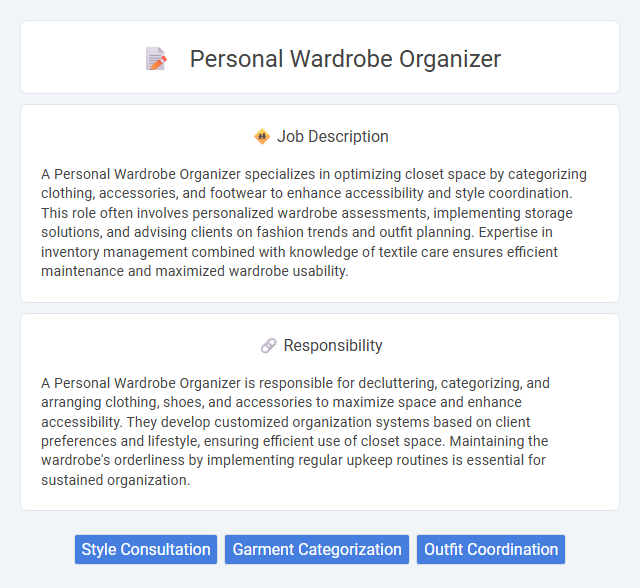
A Personal Wardrobe Organizer specializes in optimizing closet space by categorizing clothing, accessories, and footwear to enhance accessibility and style coordination. This role often involves personalized wardrobe assessments, implementing storage solutions, and advising clients on fashion trends and outfit planning. Expertise in inventory management combined with knowledge of textile care ensures efficient maintenance and maximized wardrobe usability.
People who thrive as Personal Wardrobe Organizers likely have strong attention to detail and enjoy creating order from chaos, making them suitable for this role. Those who prefer working independently and have an eye for fashion trends might find this job more fulfilling. Individuals lacking organizational skills or who feel stressed by meticulous tasks may find it challenging to excel in this position.
Qualification
A Personal Wardrobe Organizer must have excellent organizational skills and a keen eye for fashion trends to efficiently categorize and manage clothing items. Experience with closet design, fabric care knowledge, and proficiency in inventory management software are essential qualifications. Strong communication skills are required to understand client preferences and deliver personalized wardrobe solutions.
Responsibility
A Personal Wardrobe Organizer is responsible for decluttering, categorizing, and arranging clothing, shoes, and accessories to maximize space and enhance accessibility. They develop customized organization systems based on client preferences and lifestyle, ensuring efficient use of closet space. Maintaining the wardrobe's orderliness by implementing regular upkeep routines is essential for sustained organization.
Benefit
Hiring a personal wardrobe organizer likely increases efficiency by streamlining clothing choices and reducing decision fatigue. There is a strong chance this service helps maximize closet space, making it easier to find and maintain outfits. Clients probably experience enhanced confidence and time savings from a well-curated and accessible wardrobe.
Challenge
A Personal Wardrobe Organizer job likely presents challenges in managing diverse client preferences and adapting to varying space constraints while maintaining an efficient, stylish arrangement. The role may require balancing aesthetics with functionality, demanding creativity and strong problem-solving skills. It is probable that anticipating clients' evolving wardrobes and organizing needs adds complexity to the task.
Career Advancement
A Personal Wardrobe Organizer streamlines clients' closets, enhancing their personal style through expert organization and wardrobe curation. Mastery in this role can lead to career advancement opportunities such as senior stylist positions, personal shopper roles, and launching independent styling businesses. Developing strong client relationships and staying current with fashion trends are key factors in elevating one's career in wardrobe management.
Key Terms
Style Consultation
Personal Wardrobe Organizers provide expert style consultation by assessing clients' clothing preferences, body types, and lifestyle needs to curate personalized wardrobe solutions. They recommend outfit combinations, select versatile pieces, and advise on color coordination to enhance clients' overall appearance and confidence. Their expertise bridges fashion trends with individual style, ensuring functional and aesthetically pleasing closet organization.
Garment Categorization
Personal Wardrobe Organizers specialize in efficient garment categorization, streamlining clients' clothing by sorting items based on type, season, fabric, and usage frequency. This structured approach enhances accessibility and maximizes wardrobe space, promoting better outfit planning and reducing decision fatigue. Expertise in garment categorization ensures tailored organization systems that reflect individual styles and lifestyle needs.
Outfit Coordination
A Personal Wardrobe Organizer specializes in outfit coordination by analyzing clients' styles, preferences, and lifestyle needs to create versatile, cohesive wardrobe combinations. They utilize color theory, fashion trends, and body shape considerations to maximize clothing efficiency and enhance personal style. Efficient outfit coordination promotes time-saving dressing routines while ensuring confidence and polished appearance daily.
 kuljobs.com
kuljobs.com